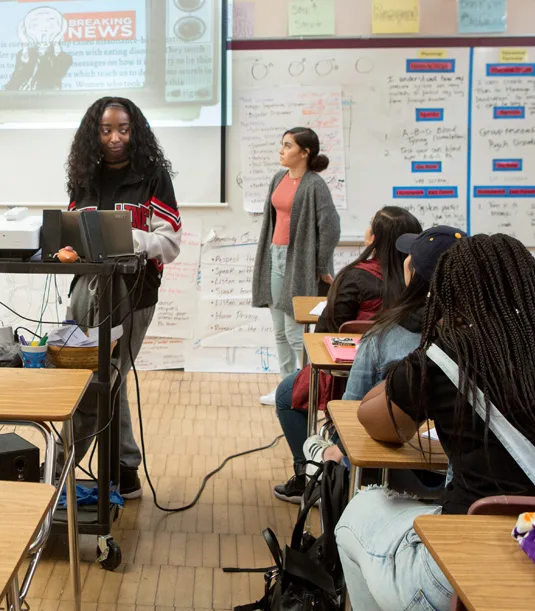New framework presents cities with unique opportunities to expand college and career readiness initiatives for students
College in High School Alliance (CHSA) paper explores success stories from cities across the U.S. tackling the dual enrollment challenge head-on
WASHINGTON, D.C. – April 15, 2025 – The College in High School Alliance (CHSA) today released a new paper, Navigating College & Career Readiness and Dual Enrollment in Urban Education Systems, to support cities as they bridge the gap between high school and postsecondary success for urban students across the U.S.
The paper was developed through conducting interviews with stakeholders connected to college and career readiness initiatives in the nation’s 25 largest cities – including Boston, Chicago, Dallas, Houston, Indianapolis, Los Angeles, Minneapolis/St. Paul, New Orleans, New York City, and Washington, DC. The paper unpacks the unique opportunities and challenges cities have to operationalize these initiatives and drive citywide impact through shared vision, strong leadership, and strategic partnerships.
“As we look toward a future where 85% of good-paying jobs will require education beyond high school, we face a critical challenge, where too few students are making the leap from graduation to college,” said Alex Perry, Coordinator of the College in High School Alliance. “That’s why we’re pleased to outline this clear vision for cities to be a bigger part of the solution. Urban environments—with their larger population sizes, proximity to community partners and higher education institutions, and presence of local philanthropy—have unique opportunity to capitalize on programs like dual enrollment, work-based learning, and apprenticeships.”
While much of the traditional focus on access gaps in college and career readiness initiatives has fallen on rural areas, data show that students in urban areas experience lower access to college and career readiness activities like Career and Technical Education and dual enrollment than their peers in suburban areas. In some parts of the country, urban access is lower than in both rural and suburban environments.
The framework offers steps and questions for city leaders to evaluate whether they are effectively leveraging everything from community partnerships and communications to funding and state policy to strengthen programming. The framework also provides steps for improvement and addressing challenges to expand the availability of college and career readiness initiatives for students.
CHSA also highlights how a number of cities and key partners stand out for their success in implementing different parts of the framework, including:
- EdVestors: Boston, MA
- Chicago Public Schools & City Colleges of Chicago: Chicago, IL
- The Commit Partnership: Dallas, TX
- EmployIndy: Indianapolis, IN
- Greater Los Angeles Education Foundation: Los Angeles, CA
- Greater Twin Cities United Way: Minneapolis, MN
- YouthForce NOLA: New Orleans, LA
- New York City Public Schools Office of Student Pathways: New York City, NY
- District of Columbia Executive Office of the Mayor: Washington, DC
Their case studies offer city governments, school districts, colleges, business partners, and nonprofits across the country with ideas for leveraging significant resources in the form of local businesses, colleges, intermediaries, and philanthropy to develop partnerships, address challenge points, and enhance and supplement their existing efforts.
The full paper is available for download here and was written by Alex Perry at Foresight Law + Policy and the College in High School Alliance, in collaboration with Andrea Johnson at Foresight Law + Policy.
For more information, please contact:
- Alex Perry Coordinator, College in High School Alliance
- alex.perry@flpadvisors.com
- (202) 431-7221
About College in High School Alliance
The College in High School Alliance (CHSA) is a coalition of national, state, and local organizations collaborating to positively impact national and state policies and build broad support for programs that enable high school students to enroll in authentic, affordable college pathways toward postsecondary degrees and credentials offered with appropriate support.
Leave a Reply
You must be logged in to post a comment.


14 Comments